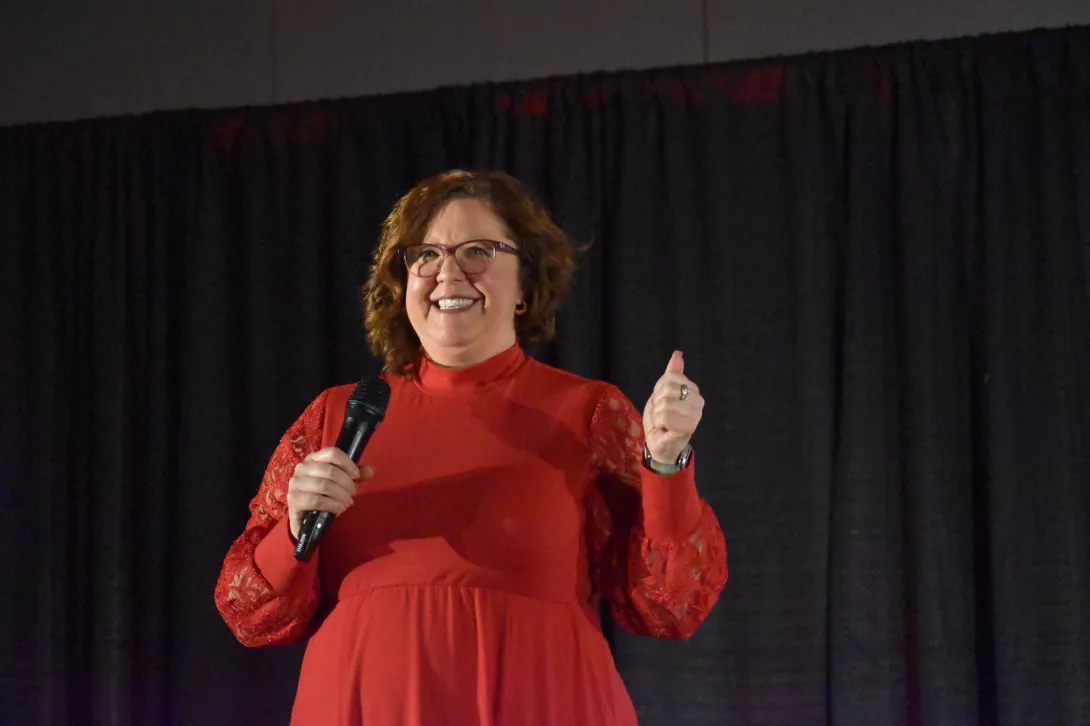
Inaugural TEDxAshland University hopes 'sparking connections' continues after its calls to action
“Keep sparking connections”
Elise Riggle, organizer
This was how Riggle, director of CITE (Center for Innovation & Teaching Excellence), ended the inaugural TEDxAshland University event, Sparking Connections, on Tuesday, Feb. 13 in the Hawkins-Conard Student Center Auditorium.
TED began in 1984 as a conference where Technology, Entertainment and Design converged, and now there are more than 3,000 independently organized TED talks like the one at AU every year in 170 countries to bring people together to share ideas and bridge divides in communities, according to the website for TEDx Corp., a nonprofit, nonpartisan foundation.
“What if every smile shared, every word spoken and every act of kindness, no matter how small, can spark a chain reaction of meaningful connection?” David Grimes, another organizer, asked the crowd at the beginning of the event.
“At TEDxAshland University, I invite all of you to spark a curiosity as we come together to explore the profound impact of these connections,” added Grimes of CITE, the AU department that sponsored the event with help from several AU staff, faculty and students.
The website for TEDxAshland University probably described it best: “Sparking Connections” is not just a theme; it’s a call to action.
Calls to action is exactly what each of the eight speakers, who ranged from AU students and professors to professionals, did with their TEDx talks, starting with:
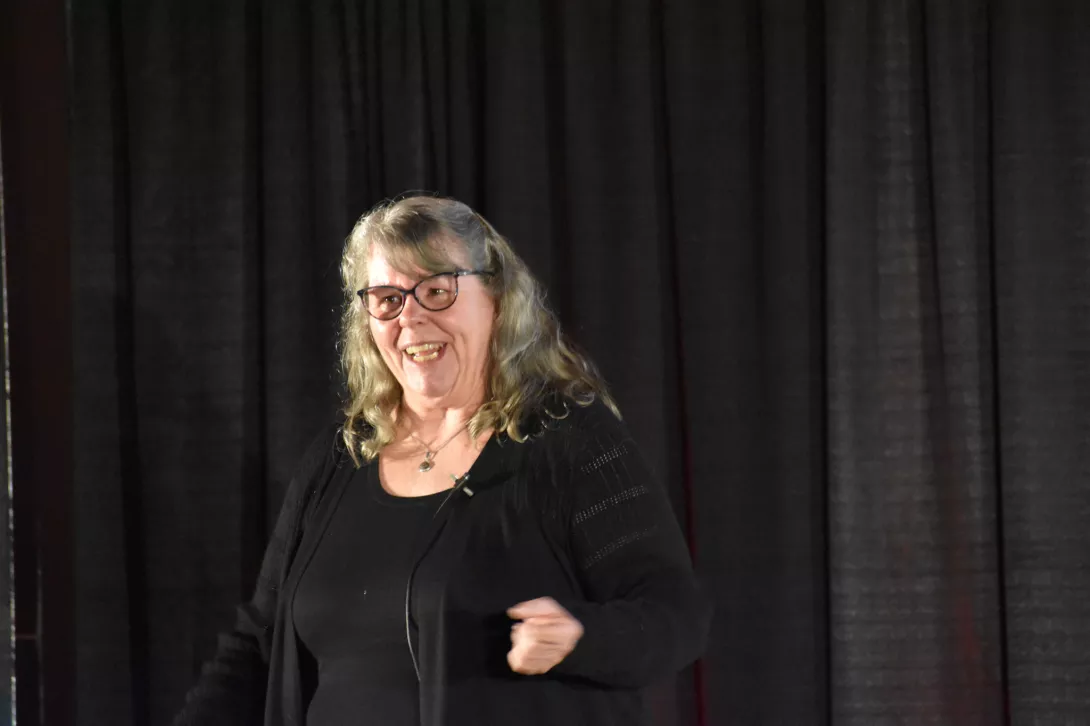
“Tell your family stories.”
Deleasa Randall-Griffiths, AU professor of Communication Studies
To inspire the audience to tell their family stories in her talk, Stories Spark Connection from the Heart, Randall-Griffiths shared some of her favorite family stories.
One of those was of her mother’s brother, George William, who died at 8 years old from a tetanus infection a few weeks after getting a splinter playing on the family’s farm.
After asking her grandmother about George William, Randall-Griffiths was able to see a box of items from her uncle’s life.
Sharing family stories reconstitutes George William and other deceased family members, as well as entertain and teach life lessons, Randall-Griffiths said.
“Go out, ask the questions, gather those stories, jot down notes,” she told the crowd. “It’s the best way to spark a connection heart to heart in your family.”
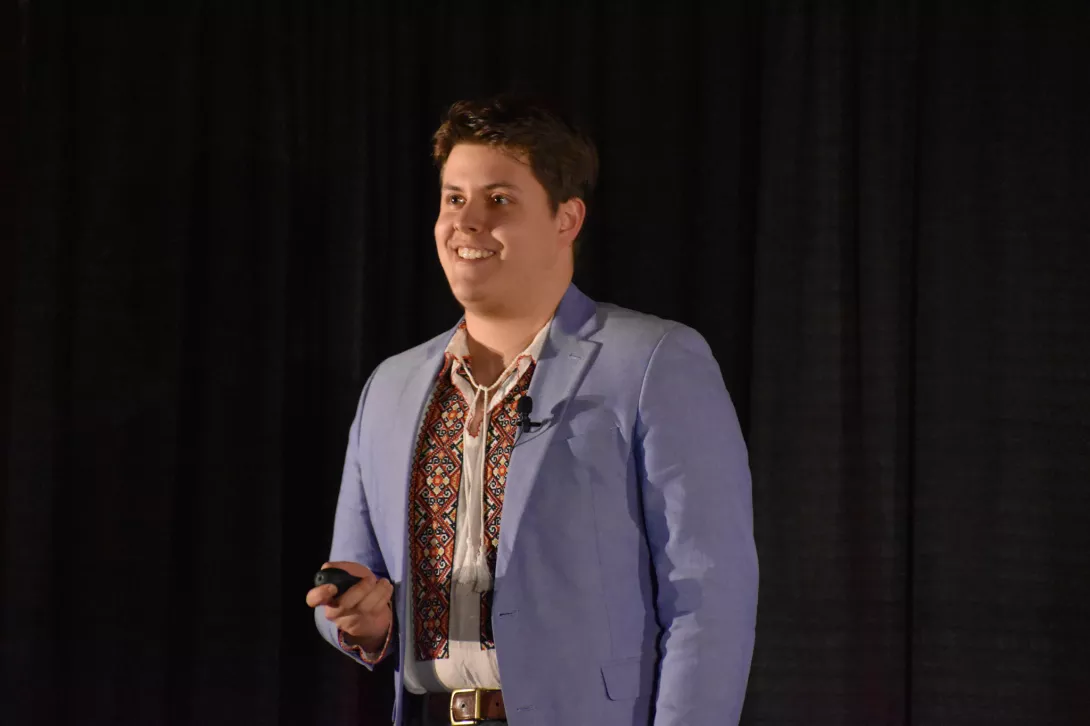
“Educate yourself, be involved, volunteer.”
Maksym Polianskyi, AU student from Ukraine
Sparking Compassion, the title of his talk, was Polianskyi’s hope for his call to action of education, involvement and volunteering.
Polianskyi told stories of how he educated himself, got involved and volunteered to foster compassion in his life by giving of his time at a cat shelter, helping Middle Eastern children transition to life in Ukraine and through mentors.
“Compassion is about love, support and trust,” he said. “Compassion is for everyone, and it’s about being curious, being an active listener and, moreover, to volunteer in order to understand someone or something better.”
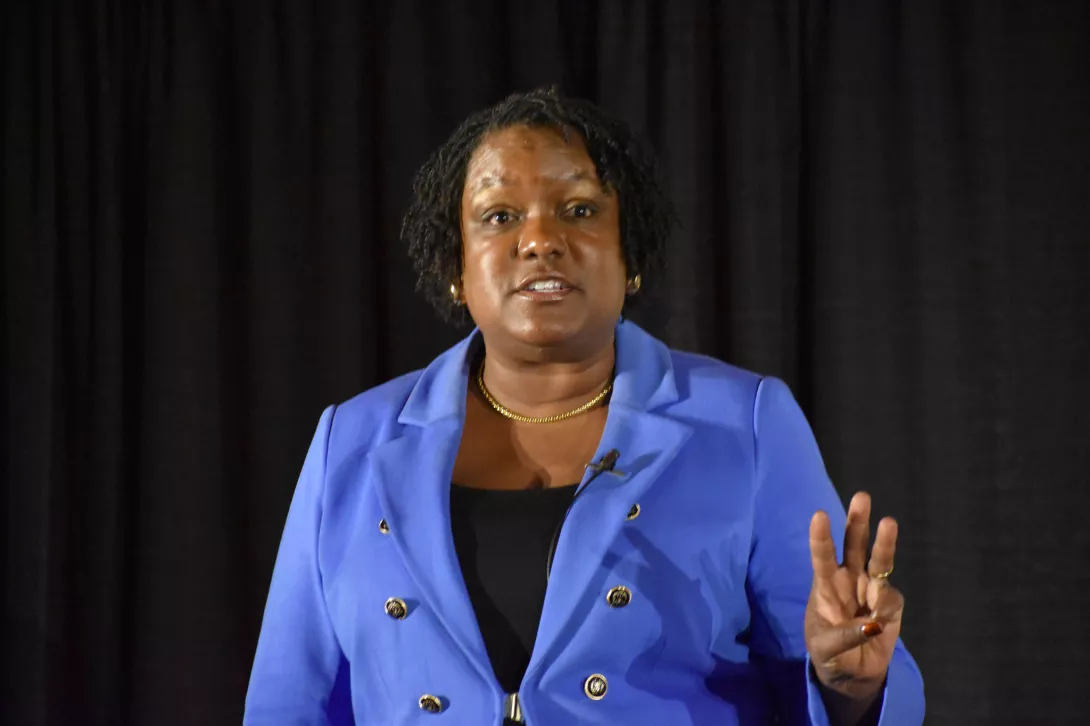
“Take a class.”
Cicely Wilson, AU adjunct professor for Correctional Education
With her talk, Education Sparks Growth, Wilson compared education to her favorite firework: a sparkler.
“For those of you who are unsure about the next chapter in your life, whether you are graduating from high school in May or haven’t been to school in 20 years, or incarcerated, hoping to turn over a new leaf, take a class,” she said. “Light that sparkler and see what ignites.”
Higher learning, which she said is any kind of education beyond high school, can spark growth in critical thinking, accepting new ideas, becoming tolerant of differences, as well as in goal setting, resilience and personal development.
“New courses may spark a new interest you may enjoy,” Wilson said about taking classes that aren’t part of a college major or may not seem interesting at first.
“Marketing and accounting classes can help plumbers and hairstylists to grow their own businesses,” added Wilson, who also said schooling, both academic and vocational, beyond high school can grow a person’s earning potential.
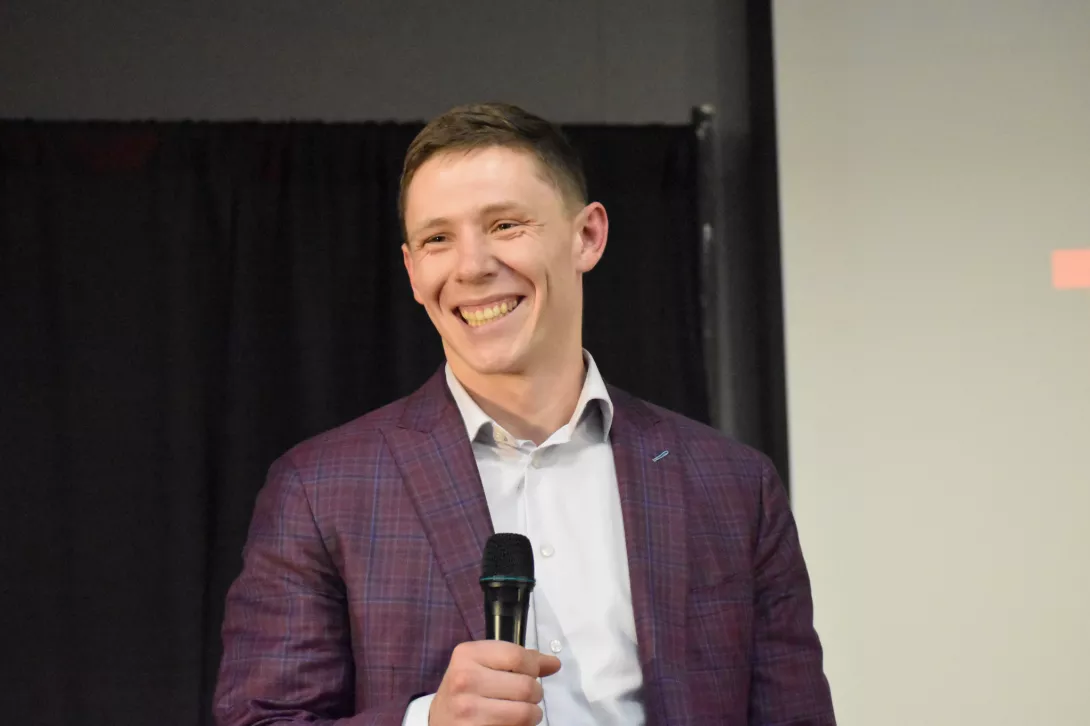
“Take care of yourself.”
Reed Byers, mental health and youth advocate
In his talk, How to Save a Life, Byers, from West Virginia, said the best way to make a difference with society’s problems of youth substance abuse, mental illness, homelessness and suicide is to start by taking care of ourselves.
“The biggest influence I’ve had on my community is with my health,” said Byers, who shared some stories from his troubled past and how he has overcome a traumatic childhood, mental illness, addiction and incarceration to finally become physically and emotionally healthy. “If we look outwards and we see these different challenges, let’s first look inward and see what we can do to correct ourselves. And from that, we step one circle outwards into our family and into our social groups because the person we’ve become in firm health, then can contribute to show up for the people who love and need us. And from there, we can reach out to our greater community.”
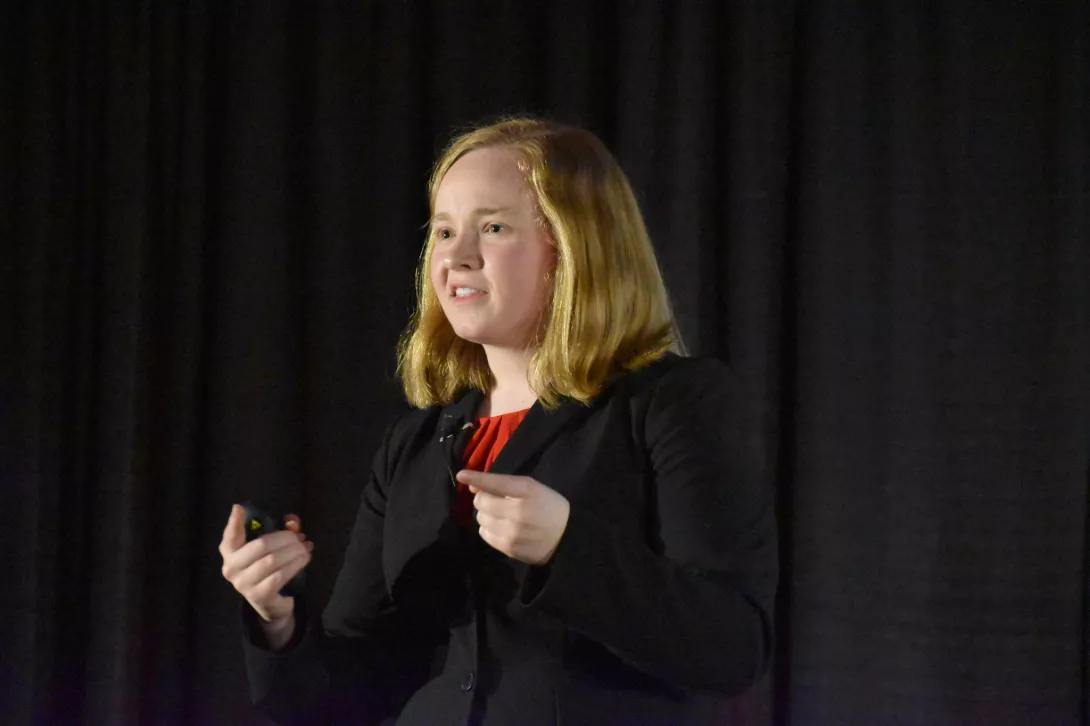
“Always remember, struggling is a gift.”
Katelyn Meeks, AU student
Getting a gift that you don’t want is like struggling Meeks pointed out in her talk, The Gift of Struggling.
“Struggling is a thing you do not want, but is a thing you need,” she added.
Using the analogy of an unwanted gift, Meeks said struggles can help us if we embrace them, see the opportunities with them and the connections with people they bring.
She told of her struggles with showing turkeys, both in finally becoming a grand champion and then in not winning again after five years of struggle to earn victory.
“When you’re struggling with something in life, there are always people there for you,” she said.
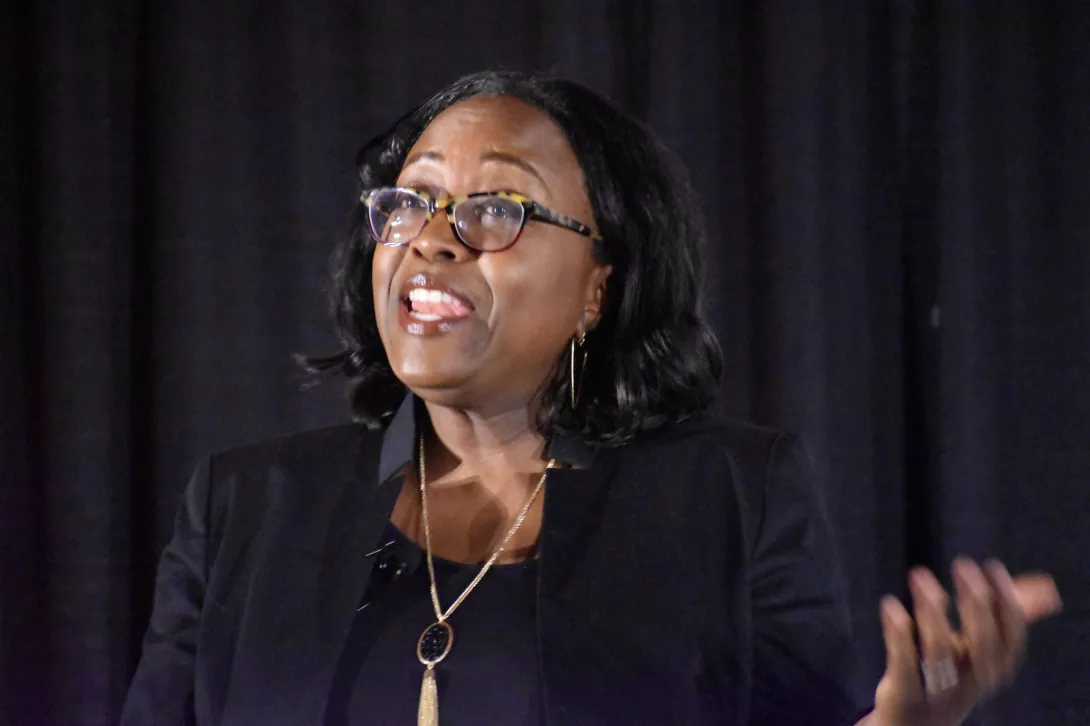
“Tell girls a different narrative.”
Johari “J.P.” Mitchell, educator, writer and creator
Hoping to challenge what society thinks girls should be, Mitchell, owner of J.P. Mitchell Creative, a strategic solutions center, said there are so many benefits as the title of her talk indicates When She Finds Her Fire.
“When a woman or girl finds her fire, we all win,” Mitchell said. “And by that, I mean, if she is able to recognize and steward all of the special things in her and show up in the world in a way that is unafraid to share those special things, then everyone benefits.”
Mitchell related a story when she regretted not bringing her fire in high school and instead shutting down and letting a male lab partner do all the work because he told her she wasn’t worthy.
While her focus was on girls and women finding their fire through cues, media and messaging, Mitchell encouraged everyone in the audience to bring their fire to the table and add it to others’ fire so we can create “the opportunity to spark important connections with one another.”
“And that allows us to see what it looks like when every lets their fire light up the world,” she said.
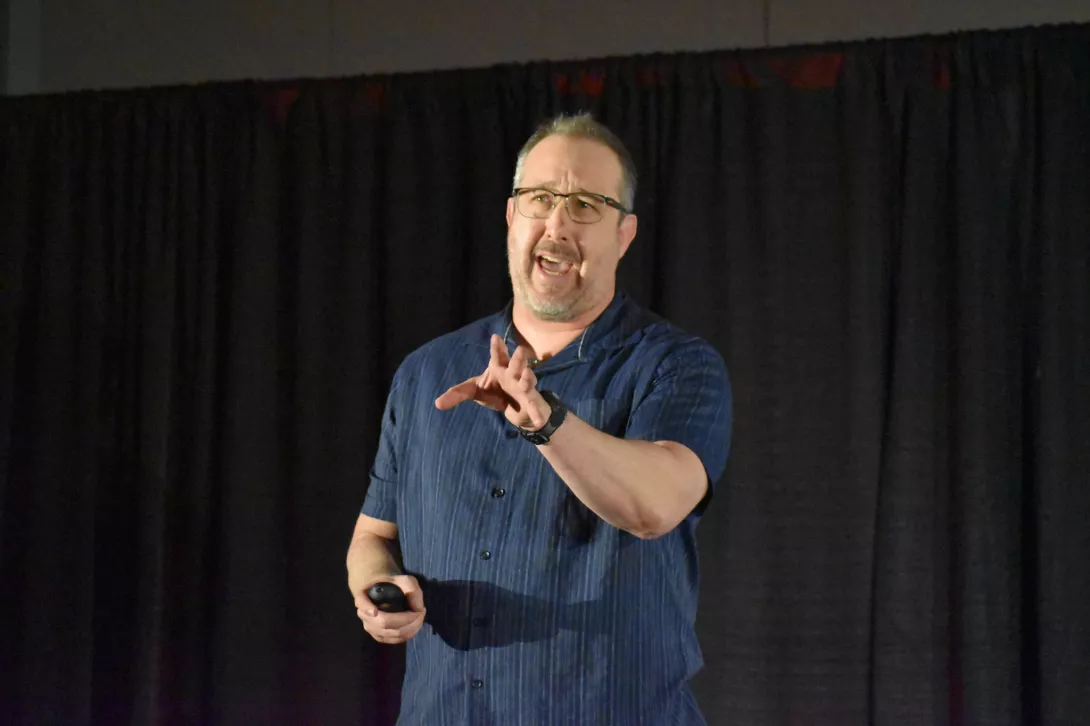
“Stay connected with yourself.”
Michael Gershe, comedian and inspirational speaker
In his Saved by Our Connections talk, Gershe started by asking: “Would it be weird to say I made a connection with Ashland University in my Speedo?”
The former AU swimmer then assured the audience he wasn’t wearing a Speedo as he talked about the many connections he has made throughout his 53 years, including five of his best friends from Ashland University.
“In our lifetime, we will spark connections with people that will impact our life in many ways and sometimes these people may even save our lives,” he said.
When the grief of losing people he made connections with, particularly his parents, aunt and one of his AU buddies, left him contemplating suicide, Gershe said remembering his lifetime of connections led him to ask for help because he didn’t want to put the people he has connected with through the pain he was feeling.
Gershe said asking for help was hard because he felt like a burden.
“No one is a burden to anyone,” he stressed to the crowd. “If you’re feeling grief, or trauma or depression, it’s very important we don’t lose sight of who we are: the values, the morals, the things our family and friends taught us.”
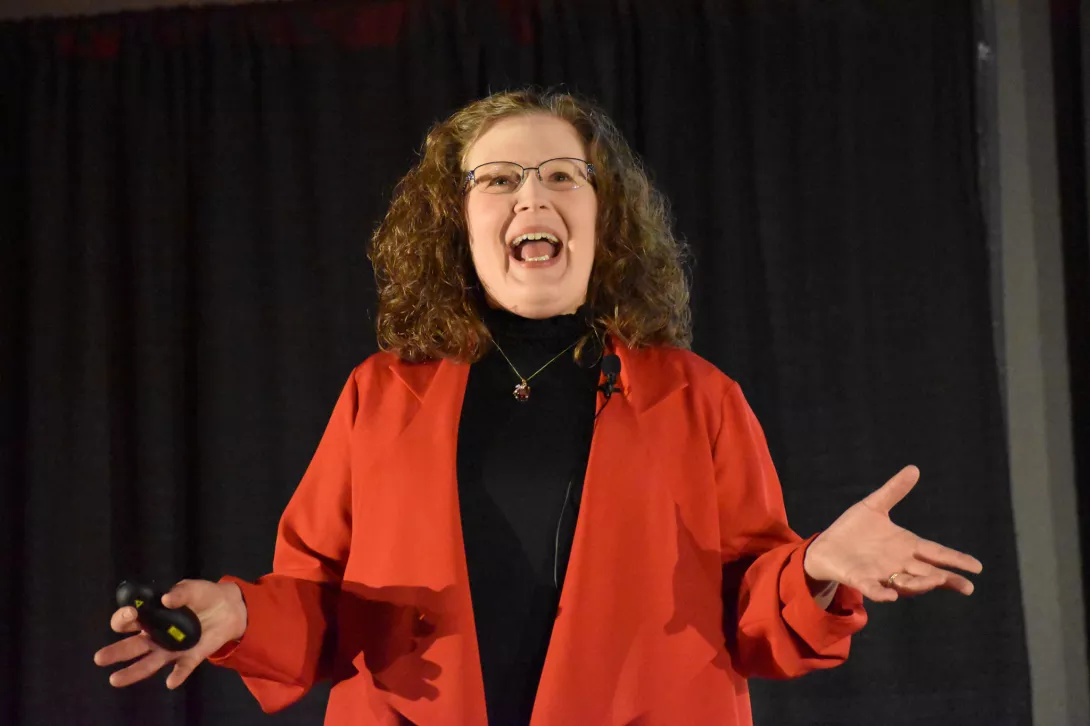
“Connect with someone who is different.”
Jennifer Wininger, instructor for international students at AU
Wininger challenged everyone listening to her to live up to the title of her talk and make Courageous Connections.
“It can take a lot of courage to make connections with people who are very different from us,” said Wininger, who led up to this challenge by sharing her experiences teaching English as a second language in China, helping international students at Ashland University now and growing up with a twin sister who has cerebral palsy. Having courage to embrace these connections has greatly enriched her life, she added.
“If we are willing to break out of the bubbles that we surround ourselves with, supposedly for our own protection, and reach out to somebody who is different than us, we may find that it’s not as scary as we imagine it is,” Wininger said.
While she admitted doing this can sometimes be a little uncomfortable, it also can sometimes be a lot of fun.
“It may turn out that the most frightening of relationships will turn out to be a friendly face come to give you the best gift of your life,” Wininger concluded with a big smile.
